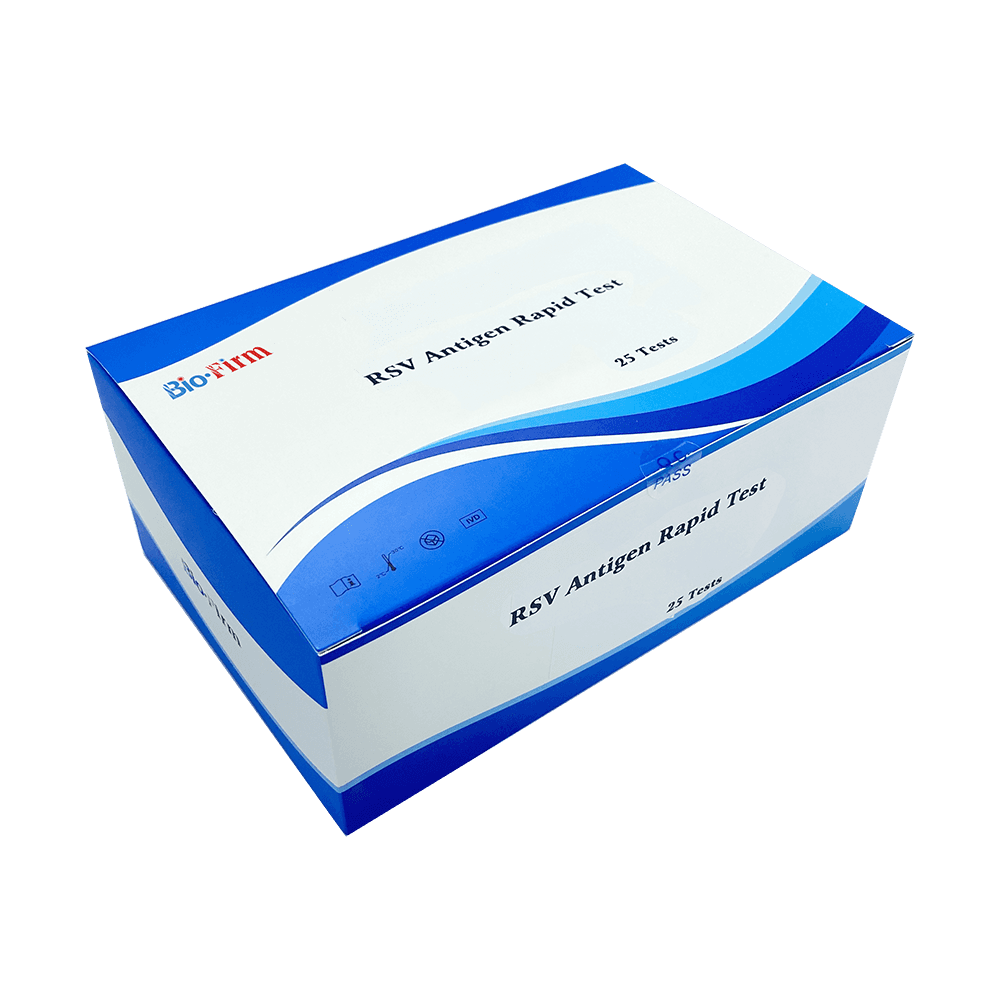Jul 01,2022
The results of an RSV Antigen Rapid Test play a crucial role in guiding treatment decisions and patient management in clinical settings, especially when dealing with infants, young children, the elderly, or immunocompromised individuals, who are particularly vulnerable to severe RSV infections. Here's how the results of the test can influence clinical decisions:
1. Early Diagnosis and Rapid Treatment Initiation
-
Positive Result: A positive result from an RSV Antigen Rapid Test confirms the presence of the virus, enabling clinicians to diagnose RSV-related illness quickly. Early diagnosis allows for timely treatment interventions, including symptomatic care (such as oxygen therapy or hydration) or antiviral treatments (e.g., ribavirin, in severe cases) to manage symptoms and prevent complications.
-
Negative Result: A negative result helps rule out RSV as the cause of symptoms, prompting clinicians to explore other potential diagnoses, such as influenza, COVID-19, or bacterial infections, which may require different treatments.
2. Impact on Isolation and Infection Control
-
Positive Result: For hospitalized patients or those in healthcare settings, a positive RSV result can trigger infection control measures, such as placing patients in isolation to prevent the spread of the virus to others, particularly vulnerable populations. This is important in preventing nosocomial outbreaks, especially in pediatric or geriatric wards.
-
Negative Result: A negative result can help to reduce unnecessary isolation and prevent the use of limited resources, allowing for better allocation of healthcare staff and equipment.
3. Guiding Supportive Care Decisions
-
Symptomatic Management: RSV is typically managed with supportive care (e.g., oxygen, fluid management, and bronchodilators), and a positive rapid test confirms the need for close monitoring, particularly for signs of respiratory distress such as wheezing, difficulty breathing, or oxygen desaturation.
-
Decision on Hospitalization: A positive RSV test result in a high-risk patient (e.g., infants under 6 months, elderly patients, or those with underlying conditions) may lead to decisions regarding inpatient care, such as the need for hospitalization, intensive monitoring, or respiratory support (e.g., mechanical ventilation or CPAP).
4. Guiding the Use of Antiviral or Antimicrobial Agents
-
Positive RSV Result: While RSV has limited antiviral treatment options, a confirmed positive result could indicate the need for antiviral medications (e.g., ribavirin) in specific high-risk cases, though its use is controversial and not commonly administered outside of severe cases.
-
Negative RSV Result: A negative RSV result can prompt clinicians to initiate treatment for other respiratory pathogens, such as influenza or bacterial pneumonia, which might require antiviral or antibiotic therapy.
5. Influence on Family and Caregiver Counseling
-
Positive Result: When RSV is confirmed, clinicians can provide families and caregivers with information about the illness, potential risks, and the typical course of the infection. This can help parents and caregivers make informed decisions regarding at-home care or when to seek further medical attention.
-
Negative Result: If RSV is ruled out, clinicians can alleviate concerns of the family and focus on explaining the alternative diagnoses. This can reduce unnecessary anxiety and guide them on appropriate care steps, which may involve managing other viral infections or treating bacterial causes.

6. Assessment of Disease Severity
-
A positive test result allows clinicians to assess the severity of the RSV infection, especially in patients with pre-existing respiratory conditions (e.g., asthma) or compromised immune systems. A more severe infection may require escalation of care, including close monitoring in an intensive care unit (ICU).
7. Reducing Diagnostic Delays
-
The rapid nature of the test allows healthcare professionals to make quicker treatment decisions, reducing diagnostic delays compared to more time-consuming methods like PCR. This is particularly important in fast-paced settings like emergency departments or urgent care clinics.
8. Influence on Preventative Measures
-
Confirmed RSV Diagnosis: When RSV is confirmed, clinicians can initiate preventative measures, including the use of monoclonal antibody treatment (e.g., palivizumab) for high-risk infants to prevent future RSV infections.
-
Negative RSV Result: A negative result may prompt vaccination against other viruses like the flu, COVID-19, or pneumococcus to prevent additional respiratory infections.
9. Clinical Decision-Making for Discharge
-
The RSV test result helps determine when a patient can be safely discharged from the hospital or clinic. A negative test may expedite discharge if other causes of respiratory symptoms are ruled out, whereas a positive RSV result may require continued monitoring, especially if the patient’s symptoms are severe.
10. Assisting in Epidemiological Tracking and Public Health Responses
-
Surveillance and Reporting: A positive RSV result can help track the spread of the virus in a community or healthcare facility, aiding in public health monitoring and outbreak management. This can guide healthcare providers on when to ramp up testing efforts or inform local health authorities.



 Español
Español
 Français
Français
 Deutsch
Deutsch
 عربى
عربى








